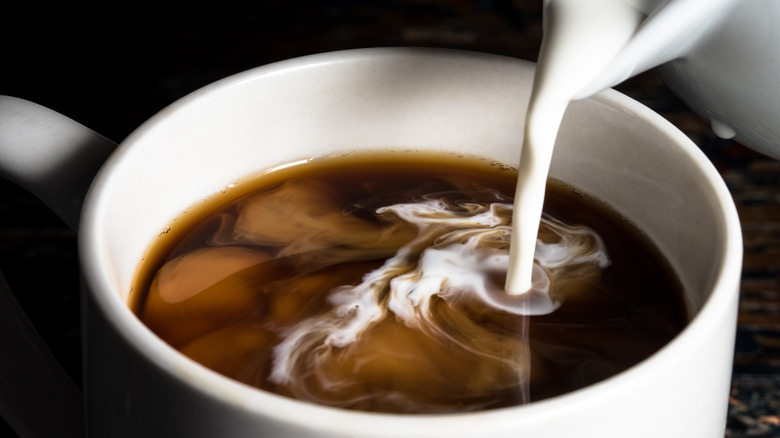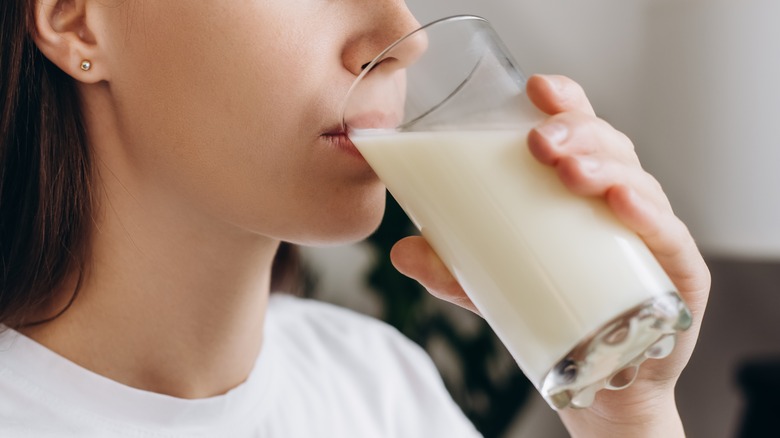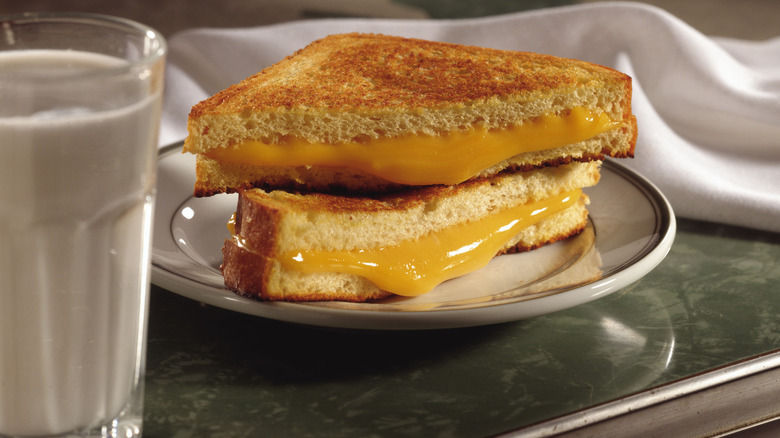The Ingredient That Makes Non-Dairy Creamer A Risky Choice For Vegans
When it comes time to eat, vegans steer clear of meat, fish, dairy, and eggs as well as other animal-derived products like fish oil and ghee, a type of clarified butter. And for some, honey's a major no-no, too. The plant-based herbivores also avoid a host of other animal-based ingredients commonly found lurking in some foods, including gelatin, which is made from the skin and bones of animals, among other body parts, and isinglass, the ingredient that makes some beers non-vegan. But, when it comes to what they drink — vegans may also want to think twice about what they use to sweeten their coffee because casein, a type of protein found in dairy milk, is actually used to make many non-dairy creamers.
How might a non-vegan ingredient be churned into a seemingly vegan creamer? Well, apparently, a label of "non-dairy" doesn't always mean a product is wholly milk-free. That's because the Food & Drug Administration currently doesn't have a regulatory definition for the term non-dairy — or dairy-free, for that matter. However, the agency does prohibit false advertising claims so any "absence claims," as they're called, must be truthful. For example, a creamer could be labeled non-dairy if it were lactose-free; however, it could still contain casein so long as the ingredients label indicates that it's a derivative of milk. Just take, for example, Walmart's Great Value French Vanilla Non-Dairy Coffee Creamer, which contains milk in the form of sodium caseinate, a compound derived from casein, despite its "non-dairy" label.
Casein comes from dairy milk
Similar to whey, casein is a major protein found in mammalian milk, comprising about 80% of all proteins found in cow's milk. In a nutshell, casein is what helps to give the creamy beverage its signature white color. When it comes to some non-dairy creamers, casein is used for much the same reason, as well as to thicken the liquid and give it a familiar note of dairy flavor.
But, casein can also affect the body on a much deeper level. When digested, the body breaks it down into an opioid peptide known as casomorphins, which can attach to dopamine receptors in the brain, thus producing opiate-like effects in much the same way that a drug like heroin might impact the body. However, in terms of non-dairy foods, casein isn't just found in coffee creamers — it can also be used in a host of other dairy-free products.
Casein can be found in other non-dairy foods, too
When it comes to casein-containing products, non-dairy creamers aren't the only culprit. The milk protein can also be found in non-dairy cheese products – helping to give them their much-favored melting and stretching characteristics. Casein can even be found in egg substitutes and certain whipped creams like First Street Non-Dairy Dessert Topping, which clearly lists the milk derivative of sodium caseinate right on the label.
That's not all: The use of casein extends beyond the food industry, too. Similar to isinglass, casein can also be used to clarify wine and can even be found in a plethora of dietary supplements and cosmetic products like serums, facial wipes, shampoos, and conditioners. However, for those looking to sweeten their coffee sans animal-derived ingredients, fret not. When it comes to buying non-dairy creamers, a good rule of thumb is to shop for vegan brands, such as Silk and So Delicious; otherwise, you'll just have to thoroughly read the ingredients label.



